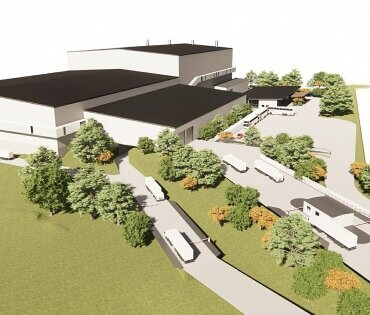
Digital mock up of Paewira
Chris Gardner continues our series of reviews of submissions and reports on the proposed Te Awamutu waste to energy plant.
Nearly two thirds of submissions on the proposed Paewira Waste to Energy Plant in Racecourse Road, Te Awamutu, are concerned with the effects the operation could have on air quality, emissions, and human health, according to a new report.
A total of 1353 submitters made 2173 submissions on the application and 1266 want to be heard by the Board of Inquiry. Among the submissions, 2115 are oppose, 36 support it and 10 are neutral.
Sixty-four percent of the 2173 submissions received regarding resource consent for the project received by Waikato Regional Council, Waipā District Council, and the Environmental Protection Authority (EPA) raised concerns about air quality, emissions, and human health, the EPA report written by Wratt Resource Management special adviser Carolyn Wratt says.
“Air quality and emissions to air was one of the most common concerns raised by 1393 submissions,” Wratt said.
“The comments ranged from concern in general that the proposal will generate air emissions, to concern about specific contaminants being released into the atmosphere such as dioxins and nanoparticles.”
The report said the submissions made a clear distinction between emissions arising from combustion of waste, trucks transporting waste and dust from earthworks and construction.
“Often all three generators of air emissions were raised in an individual submission. The submissions raised concerns about what happens to those emissions, particularly the contamination of water supply collected off roofs and contamination of land.”Human health was one of the most common and emotive matters raised in submissions.“Many were deeply concerned about the effect of chemical and particle emissions on the health of their children and other vulnerable members of society.” Wratt said.
“While a large number of submitters expressed concern about the potential for bioaccumulation of chemicals in future generations, it was not often clear whether they considered this would result in a health effect. A large number of submitters noted the absence of a health impact assessment in the application. Another aspect of health impacts was sleep deprivation for shift workers caused by increased truck movements.”
A large number of submitters expressed concern that “inexperienced operator” Global Contracting Solutions proposes to use “untested technology” and “the latest technology is not being used”.
“The most common positive effect identified is that the proposal reduces the amount of waste going into landfills. Other submitters recognised the generation of electricity as a positive by-product, by increasing not only the availability of electricity but diversifying the generation of electricity. A number of submissions identified other locations in the world where similar plants have established,” Wratt said.
Waipā District Council and Te Awamutu-Kihikihi Community Board are among those opposing the development.

An aerial view of Paewira’s proposed ‘footprint’ in Racecourse Rd. Photo: Supplied.










